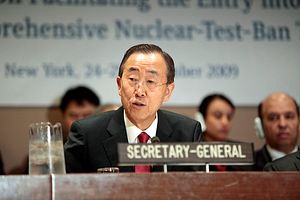For years, South Korea watchers have speculated that former UN Secretary General Ban Ki-moon would seek to exchange the top post of the international body for the top position in his home country of South Korea. When Ban’s UN term ended this year, he seemed ready to do precisely that, never quite declaring an official entry into the presidential race but certainly heavily implying his interest.
His all-but-official campaign, however, came to an anticlimactic end before the presidential race even started. In an unexpected press conference on Wednesday, Ban announced that he will no longer seek to run for office. “I will give up my pure aspirations to achieve a change in politics under my leadership and unify the country,” Ban said, citing attacks and criticisms from political opponents and the media as the reason for his change of heart.
Ban’s road to the presidency was never going to be a smooth one. Last fall, a corruption scandal involving a close confidante of President Park Geun-hye broke into the headlines. As the investigation wore on, the president herself was implicated, leading to Park’s impeachment by the National Assembly on December 9. Her fate now lies in the hands of the Constitutional Court, which will decide whether to uphold the impeachment.
If, as expected, the Court sides with the overwhelming majority of public opinion, it would trigger a new presidential election within two months. The Constitutional Court can take up to 180 days to reach its decision, but some observers expect a judgment more quickly, as early as this spring.
That wouldn’t have given Ban much time to overcome the growing odds stacked again his presidential bid. For one thing, though Ban himself has served in both conservative and liberal administrations in the past, he’s seen as more of a rightist. Prior to the scandal, Ban was largely expected to serve as candidate for the ruling conservative Saenuri Party – an unfortunate association for Ban, as Saenuri’s image has now been dragged down along with Park’s.
The scandal has in turn given a boost to public approval of Minjoo Party leader Moon Jae-in, who in a mid-January poll was leading Ban in a hypothetical presidential race, 31.4 percent to 20 percent. Tellingly, Ban’s numbers were unchanged from the previous poll, taken in December; Moon’s, on the other hand, had climbed 11 percentage points.
Ban was also plagued by his own personal scandals. Just before Ban returned to South Korea, news broke that his brother and nephew had been charged with corruption by U.S. prosecutors in a case linked to the sale of a property in Vietnam. Ban declared himself “perplexed and embarrassed” by the scandal, but stopped short of offering a frank assessment of his relatives’ alleged actions. Ban himself was implicated in a local media report, which claimed he had accepted a bribe while serving as foreign minister of South Korea (a charge Ban denied).
Apparently, the combined weight of his own scandals and the larger image problem of South Korea’s conservatives convinced Ban not to run. In his press conference, he railed against the “parochial, selfish attitudes” that destroyed his hope for changing South Korea’s political culture. Ban also accused unnamed opponents of “slander close to personality murder and various fake news reports,” which he said left him disillusioned. Though he said the experience had left a “big scar” on himself and his family, Ban added, “I will not give up my dream and vision” of “unifying divided public opinion.”
However he pursues that dream, it apparently will not involve a bid for political office at this time. On Thursday, Ban indicated as much, saying, “It is not desirable to say politics should be left only for politicos to do. Politics must be open to all citizens.”
Ban’s withdrawal leaves South Korea’s conservatives – Saenuri, as well as the newly formed Barun Party – without a clear candidate for the upcoming elections, which will be held by the end of the year even if Park is reinstated by the Constitutional Court. Meanwhile, Moon Jae-in sees his closest competitor withdraw from the race, solidifying the chances that South Korea’s liberals will return to power after nearly a decade of conservatives in the Blue House.

































